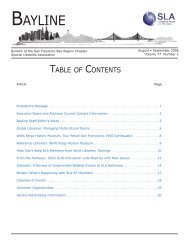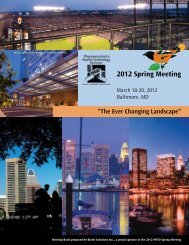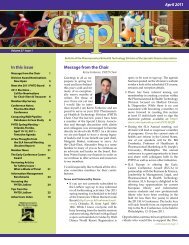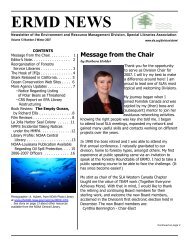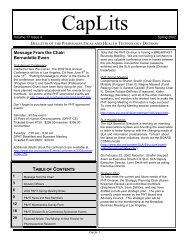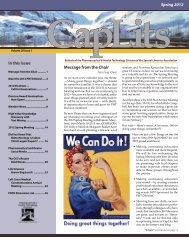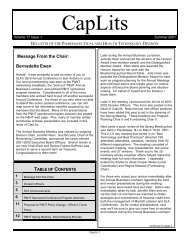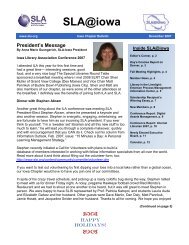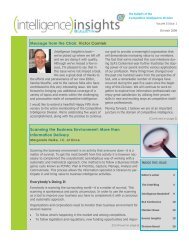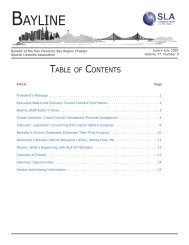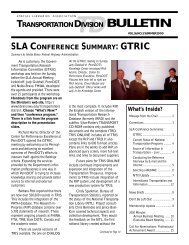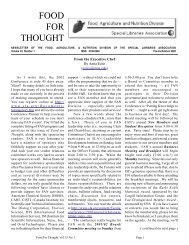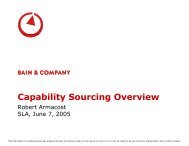Education Libraries - Special Libraries Association
Education Libraries - Special Libraries Association
Education Libraries - Special Libraries Association
You also want an ePaper? Increase the reach of your titles
YUMPU automatically turns print PDFs into web optimized ePapers that Google loves.
Information Literacy in<br />
Real Life and in<br />
Second Life<br />
By Cybèle Elaine Werts<br />
Back in the years of yore<br />
when I was a student at<br />
Temple University, I took<br />
a batch of communications<br />
classes in pursuit of my<br />
degree in video<br />
production. In one of the more esoteric ones, we<br />
often debated the meaning of media literacy as it<br />
related to the media of the time, circa early 1980’s.<br />
Did such a concept even exist? If so, what was it,<br />
and was it even relevant to our work? At the time,<br />
the consensus was no.<br />
Today, the debate on that existence and relevance<br />
has been made moot by thirty years and a<br />
proliferation of information so vast, it’s nearly<br />
immeasurable. I was typing those youthful term<br />
papers on a portable electric typewriter which was<br />
pretty nifty at the time because it had an automatic<br />
correction function, and it is to my PC today that<br />
same vast, nearly immeasurable distance. Today,<br />
we all see the results of what we call information, or<br />
perhaps technological literacy (broadly speaking).<br />
You may not know exactly what these phrases mean<br />
yet, but they affect your ability to get a job, buy a<br />
house, pay your bills, and so much more.<br />
What is Information Literacy then? What about<br />
Media Literacy, Visual Literacy and the rest? Are<br />
they the same, part of a continuum or just some Big<br />
Amorphous Blob?<br />
Let’s look at some definitions before we move on.<br />
Just so you know, there are as many definitions for<br />
these phrases as there are students with esoteric<br />
communications degrees, so I selected the ones that<br />
are short, concise, and have an excellent<br />
provenance.<br />
Editorial<br />
Visual Literacy<br />
Based on the idea that visual images are a language,<br />
visual literacy can be defined as the ability to<br />
understand and produce visual messages. This skill<br />
is becoming increasingly important with the everexpanding<br />
proliferation of mass media in society. As<br />
more and more information and entertainment is<br />
acquired through non-print media (such as<br />
television, movies and the Internet), the ability to<br />
think critically and visually about the images<br />
presented becomes a significant skill. Visual literacy<br />
is something learned, just as reading and writing are<br />
learned. It is very important to have the ability to<br />
process visual images efficiently and understand the<br />
impact they have on viewers.<br />
~ AT&T/UCLA Initiatives for 21st Century Literacies 1<br />
Information Literacy<br />
Information Literacy is defined as the ability to<br />
know when there is a need for information, to be<br />
able to identify, locate, evaluate, and effectively use<br />
that information for the issue or problem at hand.<br />
~ National Forum on Information Literacy 2<br />
Digital Literacy<br />
Digital literacy is more than just the technical ability<br />
to operate digital devices properly; it comprises a<br />
variety of cognitive skills that are utilized in<br />
executing tasks in digital environments, such as<br />
surfing the web, deciphering user interfaces,<br />
working with databases, and chatting in chat rooms.<br />
~ Eshet-Alkali & Amichai-Hamburger 3<br />
Media Literacy<br />
Media Literacy is a twenty-first century approach to<br />
education. It provides a framework to access,<br />
analyze, evaluate and create messages in a variety of<br />
forms — from print to video to the Internet. Media<br />
literacy builds an understanding of the role of media<br />
in society as well as essential skills of inquiry and<br />
self-expression necessary for citizens of a<br />
democracy.<br />
~ Center for Media Literacy 4<br />
<strong>Education</strong> <strong>Libraries</strong>, Volume 31, No. 2, Winter 2008 6



